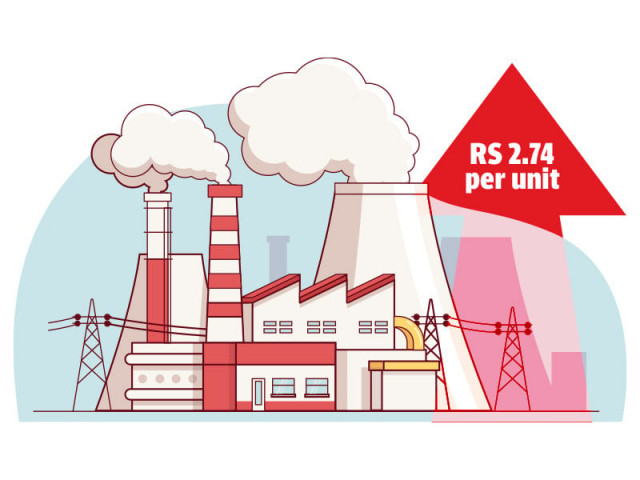Power consumers to pay extra Rs85b
NEPRA approves tariff hike of Rs2.74 per unit under 2nd quarterly adjustment

The National Electric Power Regulatory Authority (Nepra) has approved an increase of Rs2.7492 per unit in electricity tariffs on account of second quarterly adjustment for financial year 2023-24.
The quarterly adjustment will have a total impact of Rs85.2 billion on consumers for the October-December period of FY24.
The currently applicable two quarterly adjustments of Rs4.43 per kilowatt-hour (kWh) shall cease to exist from March 30, 2024.
While considering the interest of consumers, Nepra decided to apply the second quarterly adjustment from April 2024 onwards, ie, after the expiry of the existing quarterly adjustments.
The second quarterly adjustment will be recovered from all consumers of ex-Wapda distribution companies (DISCOs) and K-Electric, except for lifeline consumers, over a three-month period from April to June 2024.
Thus, consumers will get a relief of Rs1.68/kWh in their monthly bills from April-June 2024 because of the expiry of previous two quarterly adjustments.
On Thursday, Nepra also conducted a public hearing on fuel charges adjustment (FCA) for February 2024. With a reduction in electricity consumption, the consumers should brace for another tariff hike of Rs4.99 per unit on account of FCA.
The tariff increase request, linked to February’s fuel charges, came at a critical juncture, marked by a 12.2% decline in electricity demand and mounting concerns over escalating costs.
During the hearing, the Central Power Purchasing Agency-Guarantee (CPPA-G) disclosed a significant reduction in electricity consumption in February, which it attributed to a host of factors.
Nepra Member Rafiq Shaikh, while expressing apprehension about the mounting capacity payments, stressed the urgency of taking strategic measures to mitigate such expenses.
Meanwhile, officials of the National Transmission and Despatch Company (NTDC) emphasised the indispensable role of liquefied natural gas (LNG)-fuelled power plants to ensure stability of the electricity supply system.
It was informed that the growing adoption of solar energy across the nation had also left its impact on the escalating power tariffs as electricity consumption declined.
NTDC officials observed a rising trend in solar energy installations, particularly in areas like Lahore, where every other household was embracing solar energy.
The Nepra member noted the convenience of solar energy adoption for consumers but cautioned against its contribution to the escalating cost of electricity.
The hearing culminated with Nepra deferring its decision on the proposed price hike, pending further examination of the relevant data.
Nepra chairman underscored the importance of reassessing the existing tariff structure to incentivise business activities and ensure long-term sustainability of the energy sector.
CPPA-G sought an increase of Rs4.9917 per unit in electricity tariff on account of FCA for February 2024.
In a petition submitted to Nepra on behalf of DISCOs, the CPPA-G said that the reference fuel cost charged from consumers during February was Rs4.4337 per unit while the cost of energy delivered to DISCOs came in at Rs9.4254 per unit.
Consequently, it requested an increase of Rs4.9917 per unit over the reference cost. The price hike request also included previous adjustments of Rs0.5484 per unit. The petition, if accepted, will burden consumers with an additional Rs40 billion (FCA plus general sales tax). Data breakdown revealed varying costs across different generation sources, ranging from Rs1.3213 per unit for nuclear power to Rs27.1968 per unit for electricity import from Iran. No electricity was generated from high-speed diesel and furnace oil during February. CPPA-G submitted that a total of 7,130 gigawatt hours (GWh) of electricity was generated in February at a cost of Rs8.6950 per unit. The total cost of energy was calculated at Rs61,996 million.
Of the total, 6,876 GWh worth Rs64,804 million was delivered to DISCOs with transmission losses of 3.53%.
Hydel power generation stood at 1,766 GWh in February, which constituted 24.77% of the total production with zero cost.
Coal-fired power plants produced 1,129 GWh (local and imported coal: 994 GWh and 135 GWh, respectively). The share of local coal was 13.94% at a cost of Rs14.1863 per unit while the share of imported coal was 1.89% at Rs20.2194 per unit.
Local gas helped produce 787 GWh (11.04%) of electricity at Rs12.3794 per unit and the imported re-gasified LNG-based plants generated 1,450 GWh, or 20.33%, at Rs24.2952 per unit.
Power generation from nuclear plants stood at 1,660 GWh, or 23.29%, at Rs1.3213 per unit while energy imports from Iran cost Rs27.1968 per unit.
Power generation from bagasse was calculated at 101 GWh in February. Bagasse contributed 1.41% of electricity to the national grid at Rs5.9822 per unit.
The electricity generated from wind resources was recorded at 108 GWh, or 1.53% of the total generation, while solar energy contributed 90 GWh, or 1.26% of the total energy mix.
Published in The Express Tribune, March 29th, 2024.
Like Business on Facebook, follow @TribuneBiz on Twitter to stay informed and join in the conversation.











1724319076-0/Untitled-design-(5)1724319076-0-208x130.webp)






COMMENTS
Comments are moderated and generally will be posted if they are on-topic and not abusive.
For more information, please see our Comments FAQ